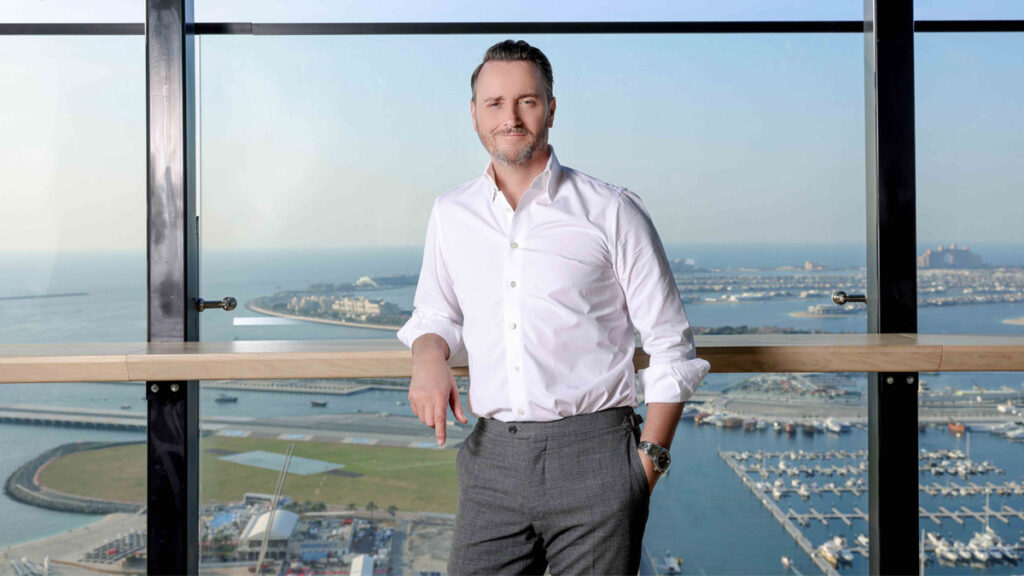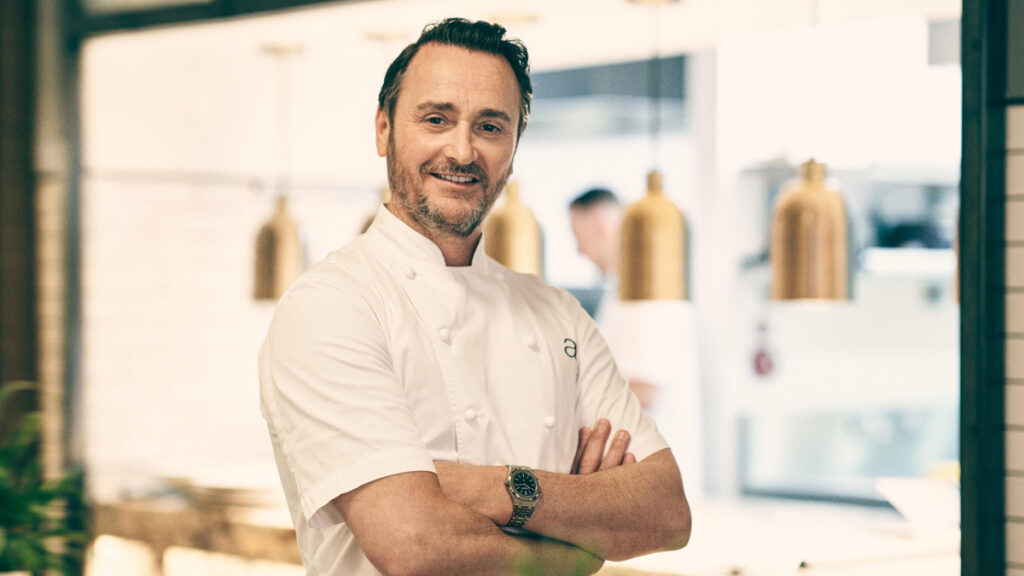Mastering the recipe for success: Jason Atherton’s entrepreneurial insights

Jason Atherton has built an international fine dining empire with a dozen restaurants around the world, including his Michelin-starred Pollen Street Social in Mayfair. After working with Pierre Koffmann, Nico Ladenis and Marco Pierre White, Atherton joined Gordon Ramsay working in Dubai and London, where Ramsay opened Maze.
After striking out on his own in 2010, Atherton, 52, opened Pollen Street Social the following year. Most recently, he opened Row on 45 in Dubai’s Grosvenor House. He plans to open three more restaurants in London this year.
We ask him what secrets he discovered in the kitchen that brought him success in business – from a famously expletive-happy boss.
What have you learnt as a chef that you have used in business?
The number one thing about being a Michelin chef is that you have to maintain impeccable standards of discipline. If you don’t have laser-focused discipline in business, it’s extremely difficult. If you take your eye off the ball for a single second or don’t constantly try to innovate or look at new ways to keep your business at the top of the pile, there are always people trying to take your position.
Cooking at an elite level on a daily basis keeps you super-disciplined and super-focused.
And working with people?
Again, when you work in elite kitchens, they are tough places. And there is no getting away from long hours in tough places. When you do go into business, you must be able to work hard, put the hours in and have the dedication needed to be at the very top – and those elite kitchens teach you that. It makes you resilient and if you become a good leader in the kitchen, there’s a very good chance you can become a very good leader in business because you apply the same principles. You lead from the front.
The classic saying is never ask someone to do something you are not prepared to do yourself. Thirty-five years ago I started washing pans in a restaurant. So, if I am prepared to wash pans, then I have the right to ask somebody to wash the pans for one of my businesses.
And handling finance?
In restaurants, the margins are tight. Everyone looks at a successful restaurant and thinks the margins must be amazing, your restaurants are full, and you are making loads of money. Well, you can have a fully booked restaurant and lose money. I know, people find that hard to believe. That is because you don’t manage the margins.
Every head chef in the kitchen always believes they need more chefs. Every sommelier thinks they need one more sommelier. Every bartender thinks they need one more bar staff.
What I’ve learnt from the discipline of being a cook is that you must apply the same discipline to your numbers.
It’s down to mathematics, what I call the four twenty-fives: 25% should be spent on staff costs, 25% should be spent on food and beverages; 25% on overheads with no more than 10% on rent and rates; and 25% should be your margin – what you’re making.
Every time you give a percentage of that back to the business or the staff costs or renegotiating with the landlord, it’s money coming out of your pocket.
I have worked for some people who ran on a 5% margin. The problem is with that is that the minute the economy turns like it has done in the past two to three years, with inflation and wage increases and customers’ resistance to price rises, you find yourself in a very precarious position, where you go from a profitable business to a lossmaker.
I make sure we have robust margins, not because we want to make loads of money, but to make sure the business is resilient to economic downturns. That’s being disciplined.

What about marketing?
I worked for one of the best marketeers that ever walked the Earth: Gordon Ramsay. The guy is just insane to watch. I was very fortunate to be one of his right-hand men for 12 years. I watched him rise from somebody who starting to get well-known to being a worldwide phenomenon. It was perfect timing for me. His commitment to expanding his “Brand Ramsay” was incredible. I saw the power of media, the power of television, the power of the press – and now social media – and how effective they are in marketing your business. It’s not just about being famous. It’s not just about wanting to be stopped in the street for your autograph. It’s about the brand every time you open your mouth about a product, a business or the latest trends, or even doing a simple recipe online.
I remember during lockdown, my wife Irha said to me: what are we going to do? I said: we are going to cook because that’s all we know how to do. We are going to share our knowledge through Instagram. We are not going to get anything for it. But what we will do is build up brand equity so that when we do go back to work that brand equity will be there. Those people will come to our restaurants and support us. And that is exactly what happened.
I went online every day at the exact same time, teaching people how to make recipes out of store cupboard ingredients and made it entertaining. People were tuning in and we got an amazing following. It worked a treat when we reopened the restaurants. Everyone came in and said: “Oh my God, your lockdown videos saved my life!” That’s the power of marketing.
What tells you things aren’t going right?
What can happen in a kitchen when you have people who are not in tune with the business? Sometimes you get chefs who are adamant that they want to put something on the menu. I say: ok, I tell you what, you can write the tasting menu, I’m going to allow you to do that. There was one particular chef who wrote it like a chef for chefs. He had things on there like sweetbreads and cockles – stuff that chefs would love to eat but the general public wouldn’t.
We put it on for a week. Our sales of the tasting menu went down the toilet. The trouble with that is our tasting menu is a lot more expensive and we make a profit out of it and people enjoy it.
I got all the data out and said to the chef: if this was your own business, because you want to cook that style of food, you have lost in that one month alone more than £75,000 worth of turnover. You have thrown all your wage costs down the toilet. If you continued to work like that, you’d be bankrupt in six months.
We’re going to put sea bass, scallops, lobster trimmings and a nice lobster bisque on the menu. All the stuff that’s recognisable to the British public who deem those products a luxury – and what they treat themselves to when they go out to dinner. We wrote the menu and put chocolate on the dessert. I told him: you may think it’s boring, but for the general public who go out every three months to a Michelin-starred restaurant such as ours, that’s what they want to eat.
We put it on and the very next day we skyrocketed back up. You never ever write a menu for yourself, you write it for the public you’re serving.
Most admired boss?
Gordon Ramsay. He taught me not just how to be a chef but a true restaurateur. He gave me my first break on TV. He’s an absolute legend.
Most admired business?
The Union Square Hospitality Group in the US under Danny Meyer. I am a massive fan of his. And in the fine dining world, Thomas Keller.




